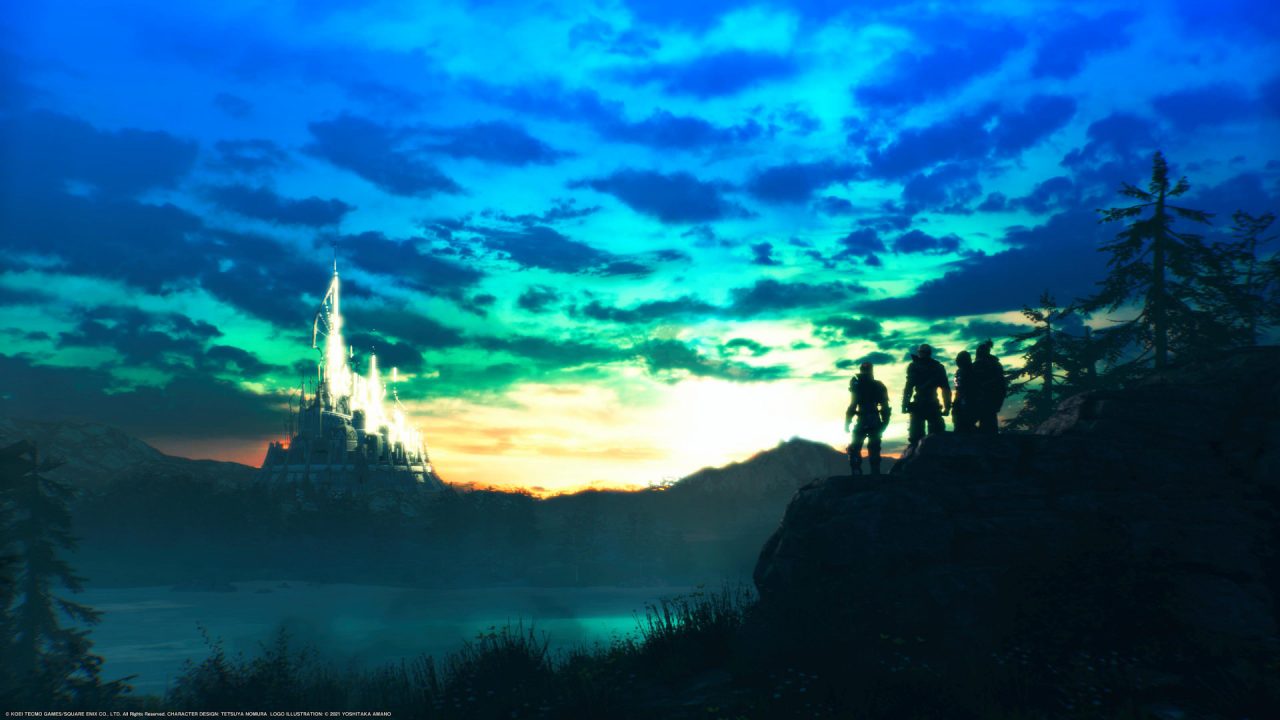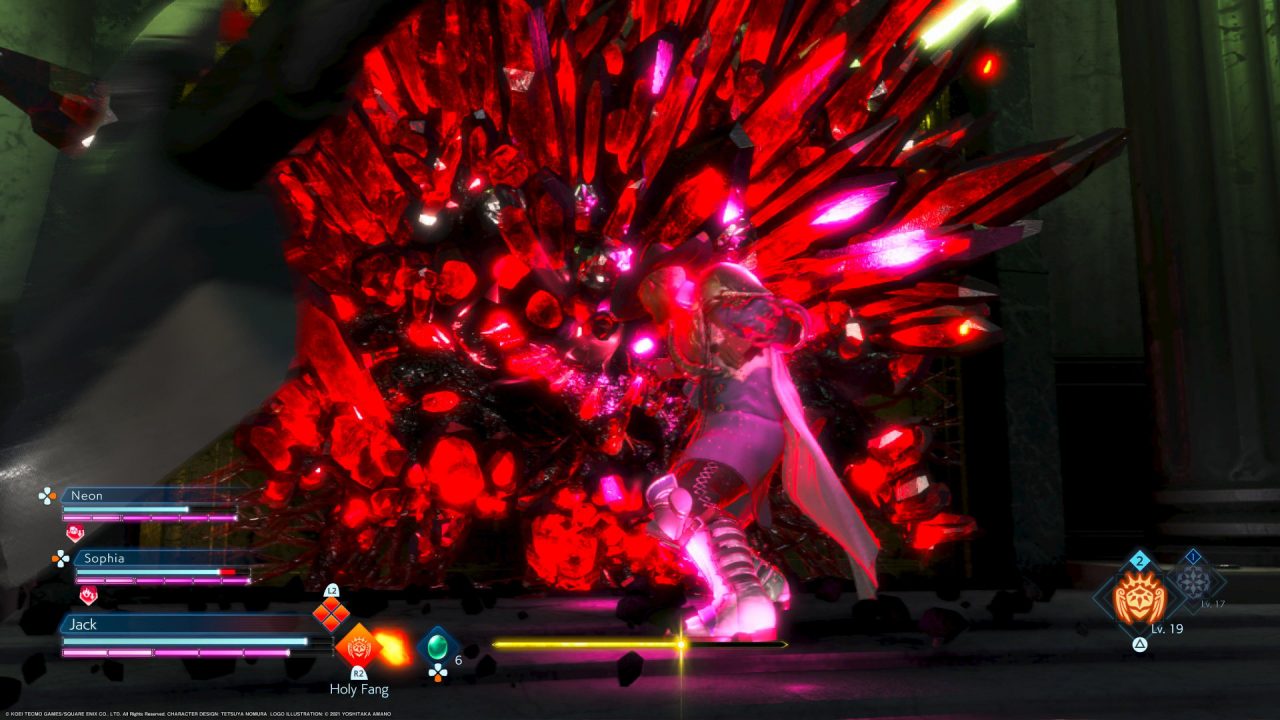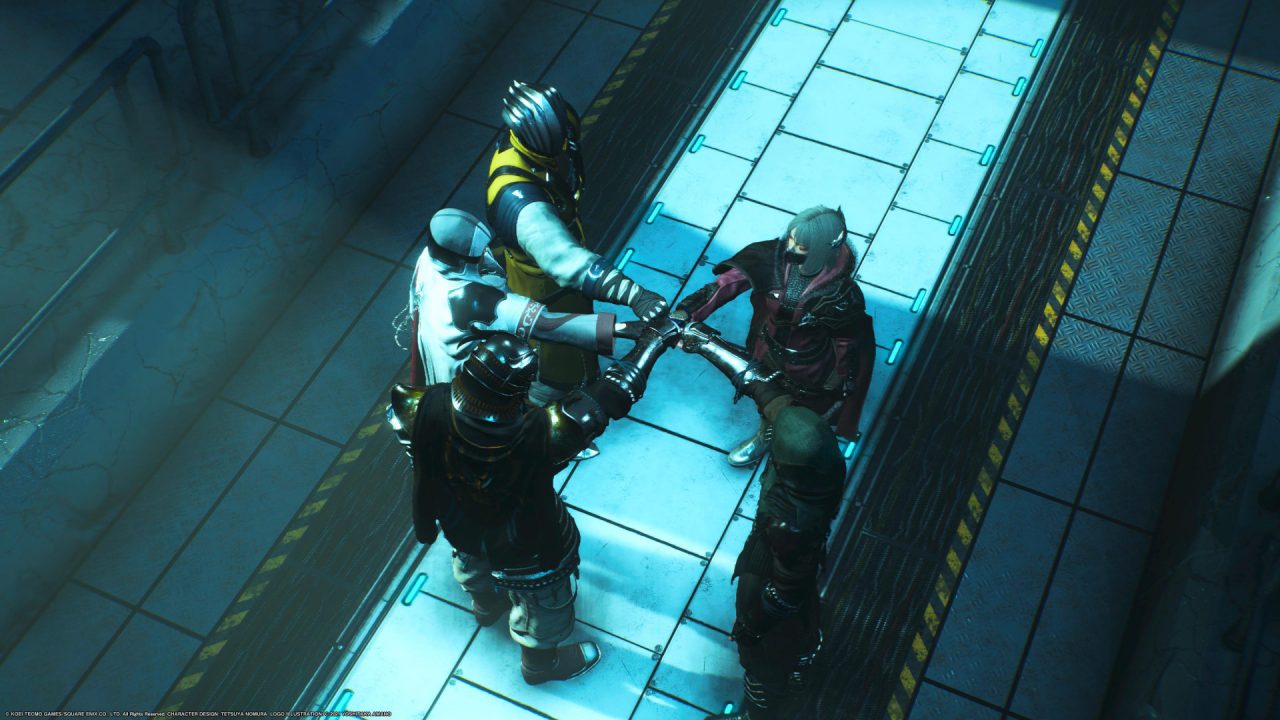The initial rumours that Team Ninja were remaking the first Final Fantasy game piqued my interest, but I found them hard to believe. When Stranger of Paradise Final Fantasy Origin was announced the rumours were proven true, but in an unexpected package that resulted in a lot of Chaos memes and general negativity online. Through demos and subsequent trailers, the shape of the actual game revealed itself and turned the tide, bringing out a lot more positivity; and now, having played it myself, I think the positivity is more than warranted. While it has its issues, Stranger of Paradise is a hell of a good game and an absolute blast to experience.
Stranger of Paradise Final Fantasy Origin stars the brooding Jack and his stalwart companions: Ash, Jed, Neon, and Sophia. They are tasked by the King of Cornelia to restore light to the four elemental crystals that govern the land and are granted the title “Warriors of Light.” For fans of the original, this is a familiar premise. Yet not all is as it seems, and the number of mysteries to solve grows quickly. For example, the party only agrees to their quest because they believe it is the best way to find and kill Chaos, something they all feel driven to do, though they do not know why. Heck, they don’t even know who or what Chaos is, likely stemming from another serious complication: the entire party has amnesia. And not just any old amnesia, but an active amnesia that continuously eats at their memories. Why are they losing their memories and what is causing it? There’s only one way to find out – by smashing their way through all obstacles and killing Chaos!
Stranger of Paradise’s story may surprise you. It may even confuse you, but if you are already on board, you are likely to love where it goes. Unfortunately, the presentation of the story isn’t always the best. It’s made up of a collection of CliffsNotes-esque cutscenes between missions, cryptic messages scattered throughout dungeons, and a steady clip of banter while you play. Still, those cutscenes are sincere, the messages intriguing, and the banter chuckle-inducing.

The vast majority of the game is spent undertaking linear missions selected from the world map. These missions bring you to locales directly inspired by areas in previous Final Fantasy titles, such as Final Fantasy III’s Crystal Tower or Final Fantasy VII’s Underwater Reactor. There are also optional missions that take different paths through previously cleared dungeons and offer important rewards, like new jobs for your AI companions and increased options at the smithy, where you upgrade your equipment. All missions can also be undertaken with other players in online multiplayer, which I didn’t have a chance to check out during the review process.
Mission rewards are also proportional to the difficulty level you play on, so if you want better spoils, crank that difficulty up. This can be done at any time from the world map, but be prepared for things to get demanding. Stranger of Paradise has three difficulty options to choose from (technically four if you include casual mode, which can only be accessed from the story difficulty level), and every player should find an appropriate amount of challenge within one of these options. It’s a game that can be formidable to overcome, but it isn’t one that demands you to play it in one way.
Combat is where Stranger of Paradise shines its brightest. It’s quick, brutal, entertaining, and wears its Nioh, Dark Souls, and character action DNA on its sleeve. Your offensive repertoire is made up of both normal attacks and action abilities. Normal attacks can be strung together and altered by a directional change, while action abilities cost MP to use and tend to have a more devastating effect. You can assign action abilities to various button combinations, such as following three normal attacks or after a held normal attack. Attacks, especially action abilities, deplete your enemy’s break gauge, and when it reaches zero they are stunned. A stunned enemy can then be defeated with a Soul Burst, a gruesome killing blow (all those poor Cactuars and Tonberries) that boosts your maximum MP for the duration of a dungeon. Although, if you ever find yourself defeated by your foes, you are transported back to your last checkpoint and lose some maximum MP.

Defensively, you have the classic guard and dodge, but you also have access to the Soul Shield. Activating your Soul Shield consumes your own break gauge, but if an enemy hits you they are sent reeling, allowing you to deliver a powerful counterattack. In addition, if the enemy uses a specific type of ability (called instant abilities, coloured purple in the UI), you can steal it by blocking it with the Soul Shield and then send it back at them with a press of a button.
Your AI companions are also surprisingly competent. They target enemy weaknesses, heal or cure status ailments when needed, and can even hold enemy aggro, which is especially important if you want to focus on casting spells. The overall flow of combat truly cannot be understated; everything you do feels incredibly fluid and planned, not to mention looks gorgeously flashy. All in all, Stranger of Paradise is some of the most fun I have experienced in action RPG combat, ever.
The two biggest sources of customization in Stranger of Paradise are the job system and the combos you can create with action abilities. Basic jobs are each tied to a singular weapon, but as you make your way down job trees you unlock advanced and expert jobs, which allow you to select from a wider variety of weapons. You level up a job by defeating enemies while using it, or spending aether shards, which grant experience points to a job upon use. Each job level grants you a point that can be spent on that job’s job tree. Weapon-specific action abilities are also unlocked in the job trees, and these carry across jobs that utilize the same weapon. So you can, for example, have much the same experience playing as a Monk or a Breaker if you use fist weapons for both. However, each job also has at least one special ability tied to it that shapes its playstyle. The Tyrant job can imbue its weapons with elemental power, allowing you to target enemy weaknesses, while a Dark Knight can greatly boost their attack at the expense of HP for every swing they take. In total, there are over twenty different jobs to experiment with, but I found it difficult to not constantly switch things up, as each is uniquely enjoyable. I would happily play an action RPG which used any single one of these jobs as its entire basis for character control and development.
Rather than leveling up Jack and his allies directly, each weapon or piece of armour has a level assigned to it. They also have a numerical affinity for a single job, and various bonus effects and stat increases. The difficulty of a mission is given as the average item level, so you might find yourself taking on optional missions to bring your item level up to par. If your gear (and any job tree nodes which boost affinity) achieves a high enough affinity, you unlock extra perks for a job, like granting a Paladin immunity to all status ailments. Unfortunately, because you are obtaining and going through so much loot, and higher-level equipment has a huge impact on your combat prowess, it is rare to even pay attention to job affinity or equipment effects. Even creating preset loadouts does little to fix this, as the loot just comes too fast. I am sure this would change in high-difficulty, endgame multiplayer runs, where you need to be more meticulous in choosing your gear, but job affinity in particular seems like a tacked-on system during the main game. Truthfully, I am not a huge fan of the loot system as a whole and would have greatly preferred a carefully curated selection of equipment.

While image quality issues persist throughout the game, and occasionally even present a blurry mess, Stranger of Paradise is still quite a looker. Dungeons are beautiful and lovingly reminiscent of their counterparts in other games; weapons and armour are aesthetically unique and intricately detailed; and monsters are suitably gross, intimidating, or even majestic. The cutscenes are a bit of a visual hodgepodge, ranging from oddly-cut and jarring to expertly-crafted grand spectacles. The animations in combat are particularly impressive and really lend weight to your actions and make you feel powerful.
As a Final Fantasy game, composed by Naoshi Mizuta no less, it shouldn’t be a surprise that Stranger of Paradise has a foot-tapping and hum-worthy soundtrack full of haunting melodies and intense battle themes. The dungeons feature remixed music from past Final Fantasy titles, and while I cannot point out a specific track I definitively prefer over the original, Final Fantasy music as a whole is so strong that they are still each impeccable pieces of music. Featuring My Way by Frank Sinatra as the theme song is just a delightful cherry on top.
It does feel like a missed opportunity that, while dungeons are aesthetically and musically based on locations in previous Final Fantasy games, the monsters found therein rarely are. While I am pleased with the selection of monsters, it does feel just a bit slim. Generally, the monsters and bosses are taken directly from the original Final Fantasy, but not even all of those make it in. You fight goblins, skeletons, ahrimans, and the four fiends, but not minotaurs, mummies, or medusae. Perhaps more will be added in future downloadable content that comes with the season pass.
Whatever comes next, I am looking forward to more time with Jack and the crew. Despite all the memes and jokes, Stranger of Paradise Final Fantasy Origin is a surprisingly earnest tale tied to an astounding combat system that is impossible to put down. Not only that, but it somehow manages to remain reverent to the original Final Fantasy and the series as a whole. I think anyone who enjoys both action RPGs and Final Fantasy will enjoy this game, too.



